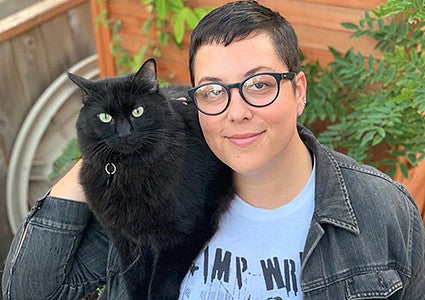
Mavis Gallo, MEd ‘20 earned their GED at the age of seventeen and spent the next twenty years working as a pastry chef, tattoo apprentice, and body piercer. Despite a challenging K-12 school experience, Mavis eventually decided to return to community college to study radiology. Instead, they found an interest in psychology. Interactions with their professors at Lane Community College and research professors from the University of Oregon inspired them to pursue a degree at the UO, where they earned their bachelor’s degree in psychology.
Discovering a love of scholarship and research, Mavis went on to complete their master’s degree in prevention science at the College of Education and is currently working towards a PhD in the same program. Mavis said that they chose to continue to study at the UO partly because of the interdisciplinary nature of its programs.
“The COE provides opportunities for collaboration with other departments and disciplines throughout the college. I have always been encouraged to explore different disciplines and ways of problem-solving. This is unique to our college and allows for a holistic perspective to issues we are researching, which leads to personal and professional growth.”
Currently, their research focuses on suicidality and institutional betrayal in the LGBTQIA community. Working with Assistant Professor James Muruthi on a pilot project funded by donors to the Hope Baney Fund, Mavis is combining their primary interests with Muruthi as he studies health disparities in marginalized groups. They are collecting data from LGBTQIA individuals in Oregon to better understand the unique function of their communities in sustaining emotional and physical health while they confront homophobia and transphobia. Mavis and Muruthi collaborated to design the study and have plans to expand it after the pilot project is complete.
“The field often uses gender or sexual minority identity as a risk factor. We’re trying to pull away from that mode of thought, and to consider what’s actually happening in these communities and systems.”
Mavis credits both Muruthi’s and Professor John Seeley’s mentorship as crucial to her success at the COE.
“John has been incredibly supportive of me as an individual, academically and personally. Not only is he an accomplished scholar, but he is also a compassionate and thoughtful human being. His support means a lot to me. James has also been an important mentor. Not only is he smart, but he’s also an amazing ally.”
Seeley said of Mavis, “The passion that they bring to their program of research to address mental health issues and prevent suicide among high-risk and marginalized populations has been inspiring to me, faculty members, and other students with whom they collaborate.”
Mavis also praised the supportive atmosphere at the COE and in their cohort in the Prevention Science Program.
“Obviously with COVID-19 it’s been a little bit tricky. None of us were expecting to complete a PhD online, but I am lucky because everyone in my program is awesome. We have been making sure to stay in touch with one another and support one another. Academia can often breed a competitive mindset, but people in my cohort help each other out.”
Mavis stressed the importance of representing their identity as a non-binary lesbian. They hope that their success can be a model and a source of hope to other LGBTQIA individuals. Mavis also hopes that they can inspire students who come from non-traditional backgrounds.
“My entire family is working class and school felt like a frivolous activity not meant for someone like me. Now that I’m part of it, I believe academia is meant for people like me and those who do not fit the mold of the stereotypical scholar. Different ways of being and conceptualizing issues are crucial to advancing science.”
—By Celeste Christie, College of Education
